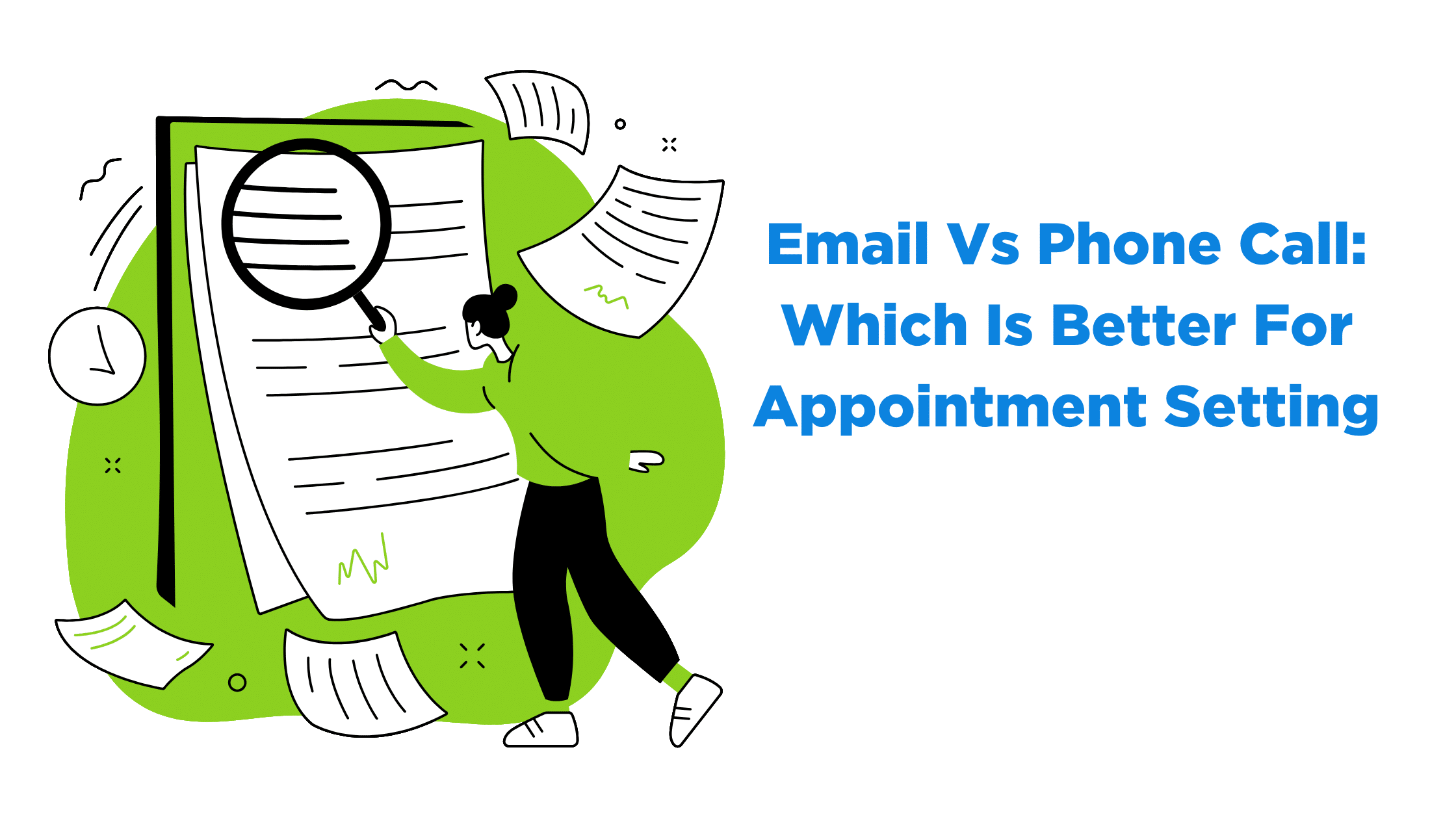Email vs phone call – The two major modes of communication through which you can convince your audience and convert them into your customers.
Setting appointments with the highest potential clients is a crucial step. In this step, the prospects are just a meeting away from becoming your brand’s customer. To bring them closer to the end of the sales funnel, you have to carefully curate your lead generation strategies.
This article will compare and contrast the pros and cons of email and phone calls, and highlight which mode is more suited for which scenario.
Table of Contents
- Communication Modes for Prospecting
- Email in Appointment Setting
- Pros and Cons of Email
- Phone Calls in Appointment Setting
- Pros and Cons of Phone Calls
- Email vs Phone Call – Who are You Setting an Appointment With
- Using Both Email and Phone Calls for Setting Appointments
- FAQs
- Related Posts
Communication Modes for Prospecting
Appointment setting can be quite a time-consuming and tedious task. That’s why throughout years of development, we have tried our best to make this task easier.
Some solutions include creating a standard script for calling individuals over the phone. Others include creating multiple templates for sending emails. Other companies even go through automating the process altogether!
But today, we will be focusing on which is the better solution between email vs phone call when it comes to setting appointments. To start off, let’s first identify the pros and cons of emails and phone calls.
Email in Appointment Setting
Email is widely considered a professional mode of communication. A survey by MarTech Alliance says that 89% of marketers prefer email for their lead generation strategies. With compelling and persuasive content, emails might be the right choice for attracting clients. Emails stay in the inbox of your prospects even if they are not available at the moment of your communication. They can have a look at it and respond whenever they can.
Pros and Cons of Email
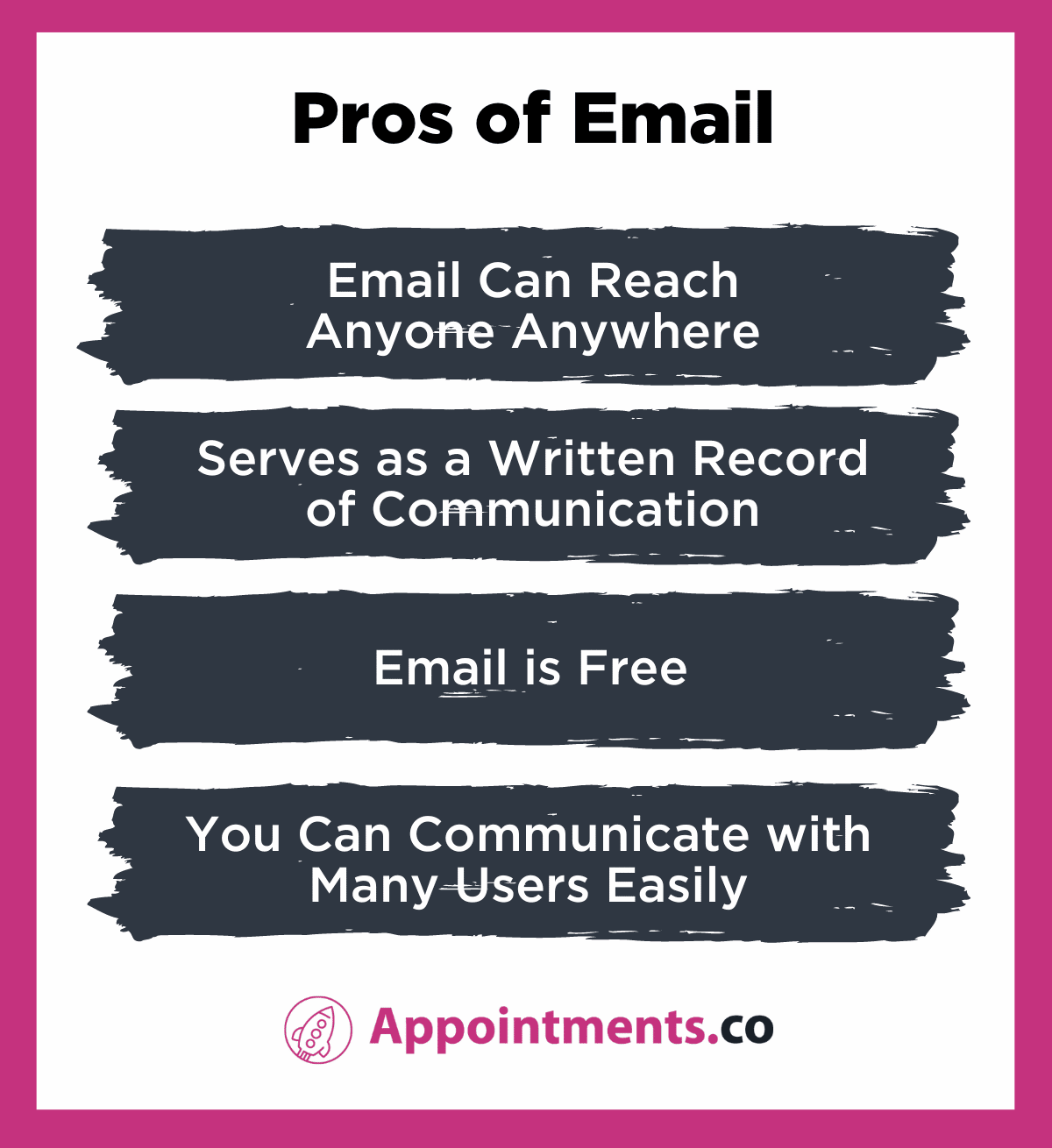
Pros
1. Email Can Reach Anyone Anywhere
Email is used universally so it doesn’t matter if the recipient is on the other side of the world. People will always get their email as long as they have an internet connection. This can be extremely powerful if you’re setting appointments with people from different time zones.
If you don’t want to bother people outside of their working hours, you can also schedule your emails ahead of time. This allows you to automatically send emails without having to manually click the send button right before you send it. This can be helpful if you’re sending appointment details with international associates.
2. Serves as a Written Record of Communication
Your email serves as a written record of the information that you need to communicate with your recipients. This can be extremely useful for appointment setting!
Appointments can contain a lot of key information that recipients must remember. If your recipient has lots to do and is leading an extremely busy life, they may forget some key information they need about their appointment. With emails, they can easily search for the email in their inbox and go over the information they need whenever they need it.
3. Email is Free
Emails have become an integral part of our communication today. It’s used for both personal and business purposes. You can easily send all the information you need without needing to pay for anything! On top of that, email is also a paperless way to communicate so it’s both more affordable and more environmentally friendly.
4. You Can Communicate with Many Users Easily
There are instances when you have to set appointments with a large number of individuals. Take conventions or large international meetings for example. In this scenario, emails can make it easy for you to send out the details of an appointment with all of these individuals.
Email allows you to deliver information to a large number of recipients easily and efficiently. You even have the option to automate some processes so you can personalize emails by addressing each user by their provided name.
Cons
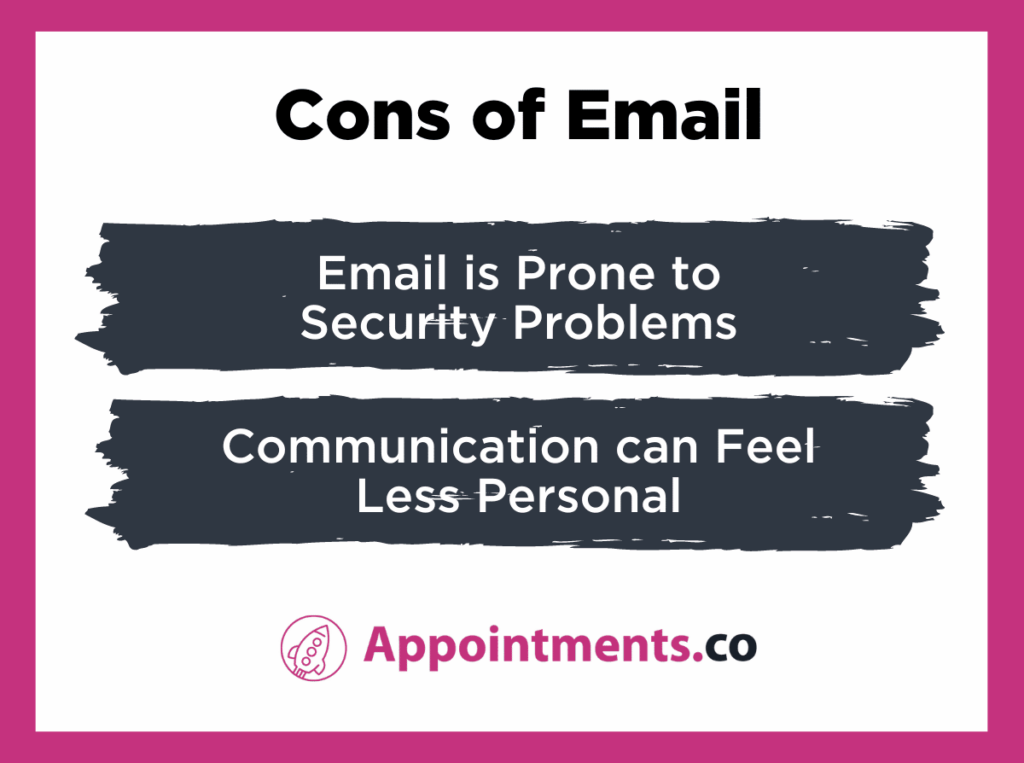
1. Email is Prone to Security Problems
Emails being accessible anytime and anywhere with an internet connection can also be a problem. Emails that contain sensitive information can be compromised if not enough security measures have been taken.
Some of the security measures that you can do to secure your email is to include two-factor authentication. This requires the recipient to provide relevant information like your phone number.
You can also choose to encrypt your email. This jumbles up your email and only the person who intended to receive it has the key to decipher it. This can greatly increase the security of your emails.
2. Communication can Feel Less Personal
Emails are delivered with only written text. If constructed poorly, it can be devoid of emotions and can come off as less personal. If you’re trying to make people feel a certain emotion, emails may not be the best way to go.
Additionally, if you’re sending emails to a large number of people, emails can also come off as generic. To solve this, you can automate emails in a way that addresses users by the first name that they provide.
Phone Call in Appointment Setting
A phone call is another effective way to grab the audience’s attention. But, receivers might not answer the call or hang up halfway. Still, if you managed to collect the contacts of the ideal customers of your business. The chances are high for your to get them on your side through a call. A survey says, 82% of people accept an appointment if they are approached through phone calls. The best advantage of the phone call is that your communication with the receivers can be more personalized, so the receiver can develop trust in your service and the brand.
Pros and Cons of Phone Calls
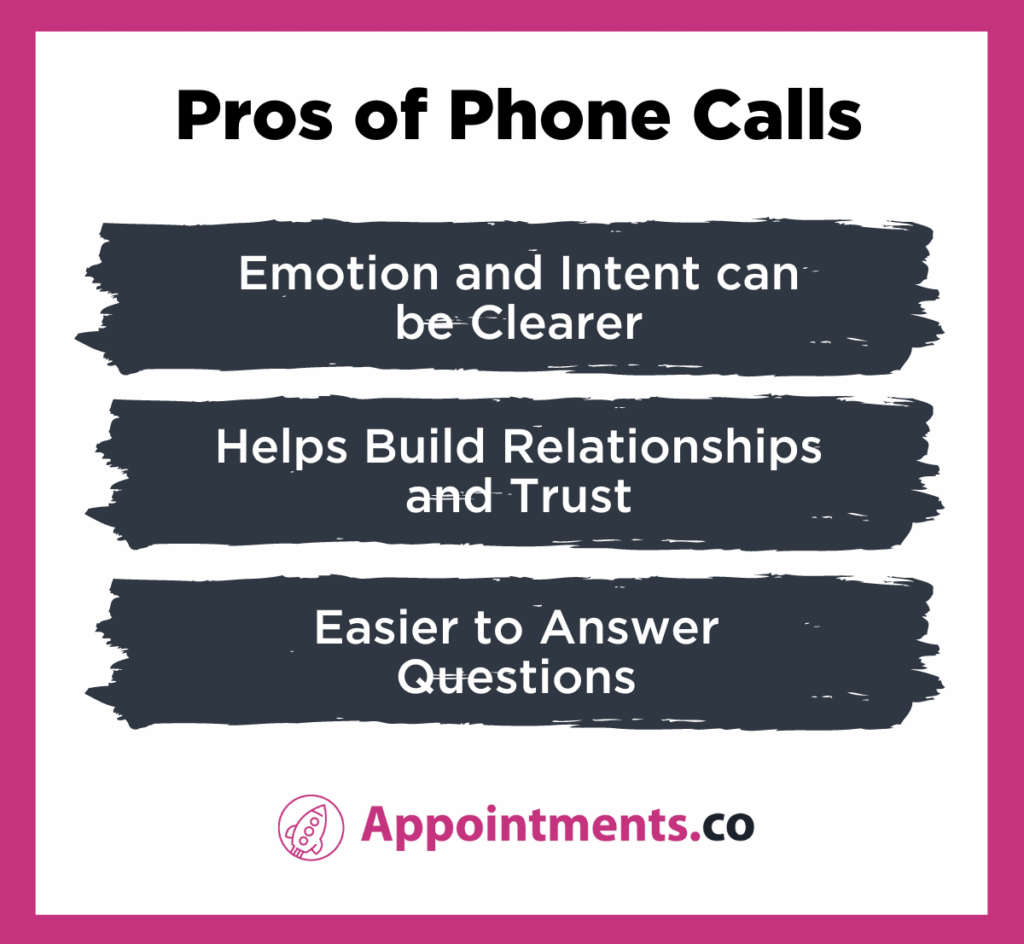
Pros
1. Emotion and Intent can be Clearer
A phone call allows you to use paralinguistics. This is a form of nonverbal communication that includes factors like the tone, loudness, inflection, and pitch of your voice. These factors can significantly affect how you communicate your message.
This makes it easier for you to communicate your intent. Additionally, you can also express your emotions through your voice. In setting appointments, this is important so that you can express your excitement or joy in meeting the person you’re calling.
2. Helps Build Relationships and Trust
Compared to emails, phone calls are a better way to establish trust and build a relationship with the person you’re setting an appointment with. It is much more pleasant for a lot of people to interact with actual people instead of just reading an email.
3. Easier to Answer Questions
A phone call allows you to be present for any quick questions that the person on the other end might have. This is perfect for setting up appointments where the people attending may have to follow up questions about the details of the appointment.
Compared to emails, phone calls allow people to ask you questions immediately as you are still on the phone call.
Cons
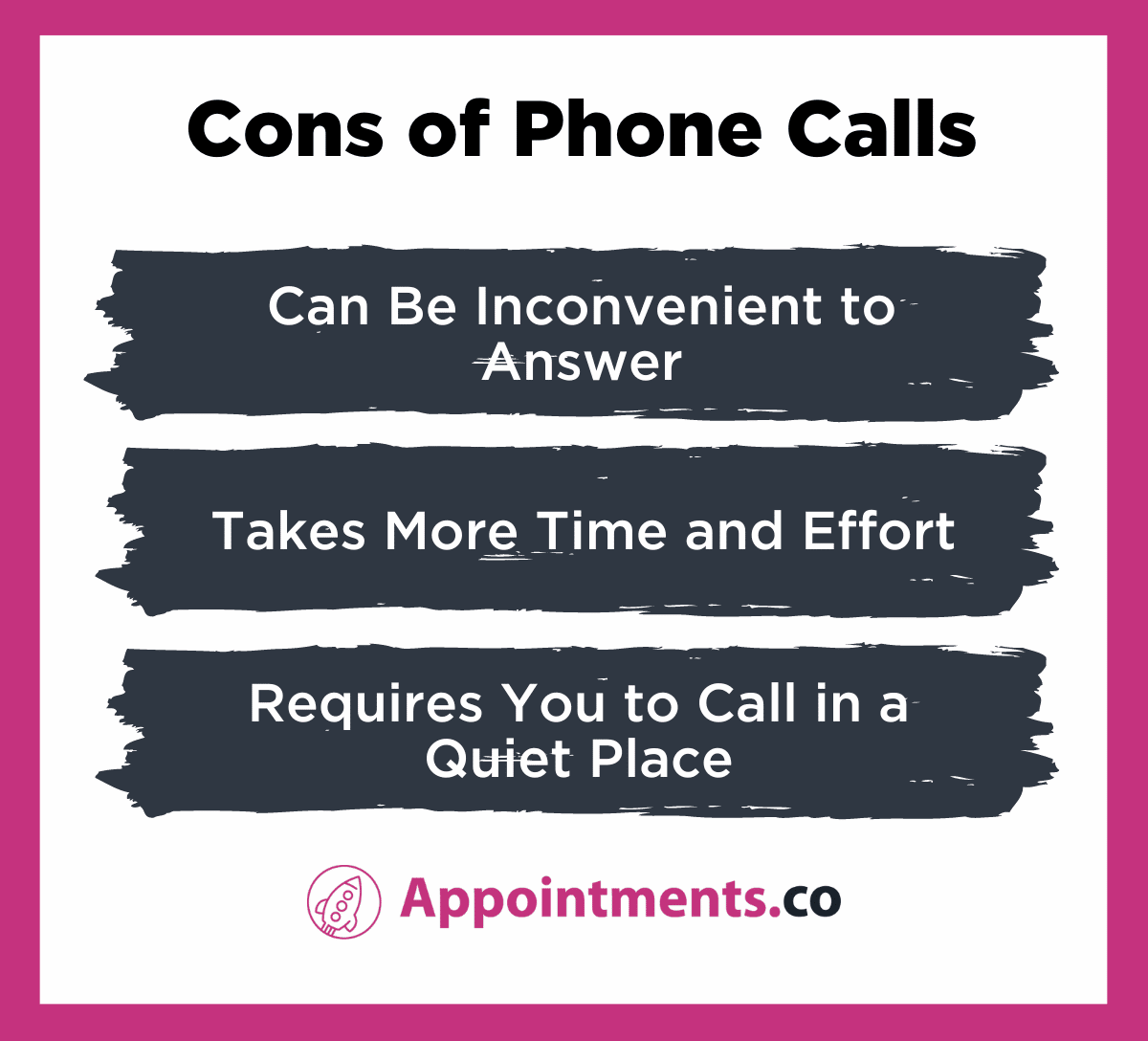
1. Can Be Inconvenient to Answer
There are a lot of people who find it inconvenient to answer phone calls especially if they’re out and about or driving. There are also a significant number of people who are always too busy to take a phone call or have anxiety about answering calls in general.
This is why you have to keep in mind that when you’re calling people about their appointments, make sure to ask first if they’re free to talk. This gives them the option to receive the call now or have you call at a better time later.
Also, make sure that you keep in mind the time of day when you call. Don’t call too early or too late in the day because people still have personal lives other than work. It’s also important that you remember to consider time zones when you’re making international calls so you don’t accidentally call in the middle of the night.
2. Takes More Time and Effort
When you’re setting an appointment through a call, it will take more time and effort on your end to call everyone. Coordinating the fine details of the appointment and making sure everyone is kept in the loop can be quite time-consuming. It takes more time and effort compared to just sending an email to all of them.
This is why it’s important to prioritize starting early when setting an appointment with lots of people through call.
3. Requires You to Call in a Quiet Place
Unfortunately, you’ll need to find a quiet place to set appointments through call. Your appointments contain valuable information for the people you’re calling. If they can’t understand what you’re saying, they might misunderstand the details of their appointment.
Email vs Phone Call: Who are You Setting an Appointment With?
If you’re setting an appointment with a person whom you do not know personally, an email may be the better option. It’s much more formal and it allows the recipient to have enough time to process the information first before responding.
If you’re setting an appointment with someone who you already have a relationship with, then a phone call may be a better option. It allows you to quickly contact the person you need and helps strengthen your relationship with them since they can hear your voice.
If you’re setting an appointment with a person who is always busy and is not always checking their emails, a phone call is also a better option. It allows you to contact them through their phone and get their attention while they’re available.
At the end of the day though, in setting an appointment, it shouldn’t be an email vs phone call debate. Instead, how can these 2 modes of communication complement each other?
Setting an appointment via phone call helps make sure that your message gets to the right person. It helps you verify if the details of the people involved are correct. It also helps make sure that the person attending the appointment is well aware of the details of the appointment itself.
After making a phone call, an email with the appointment details is helpful. This gives the person a written record of all the information that they need to remember for the appointment. They can easily counter-check the details they received via phone call.
Using Both Email and Phone Calls for Setting Appointments
Emails are a great way to communicate with people who are always busy and can’t answer their phones immediately. It can also serve as a reminder or a record of the appointment details. Phone calls are a good option if you want an immediate response and if there is a potential for multiple questions. At least you’ll be there to immediately answer these questions.
Each of these forms of communication has its own strengths and weaknesses. If the question is email vs phone call, it might be hard to choose because it really depends on the situation at hand. But using them to supplement each other’s weaknesses may yield better results. Using them together helps you ensure the best appointment-setting experience.
FAQs
1. Which is more cost-efficient, emails or phone calls?
Emails are much more cost-efficient than phone calls because it doesn’t require you to have anything else other than an internet connection. It also doesn’t cost you extra if you need to send emails internationally.
2. Which needs less time and effort, emails or phone calls?
Emails need less time and effort because you can send the same email to a lot of users. You can also automate the process so you address users per their provided first name.
3. Which form of communication feels more personal, emails or phone calls?
Phone calls feel much more personal because the person on the other side of the call gets to talk to a live person instead of just reading text.
Related Posts
- Appointment Setting – The Ultimate Guide (Including 6 Tips)
- 5 Skills You Need to Have As a Successful Appointment Setter
Illustrations by Storyset
